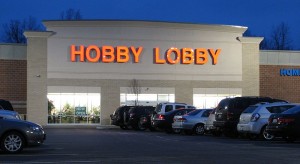 Washington, D.C. — The United States Supreme Court has refused to grant the popular craft chain Hobby Lobby an emergency injunction against Obamacare’s abortion pill mandate, requiring the company to comply at least temporarily while its case moves forward.
Washington, D.C. — The United States Supreme Court has refused to grant the popular craft chain Hobby Lobby an emergency injunction against Obamacare’s abortion pill mandate, requiring the company to comply at least temporarily while its case moves forward.
The court handed down its decision yesterday, written by Justice Sonia Sotomayor. It stated that it was not “indisputably clear” that Hobby Lobby’s request met the very high bar needed for an injunction, and pointed to the fact that the lower circuit courts have been divided on the matter, so the craft chain still has a chance at eventually winning. Sotomayor then told the company to proceed with its case in the lower circuit courts.
“Even without an injunction pending appeal, the applicants may continue their challenge to the regulations in the lower courts,” she wrote. “Following a final judgment, they may, if necessary, file a petition [in the Supreme Court].”
However, the contraceptive mandate in Obamacare goes into effect in less than one week on January 1st, and Hobby Lobby must now choose whether to temporarily comply with the regulation while its case moves forward, or face fines of up to $1.3 million a day.
The Oklahoma-based company, owned by evangelical Christian David Green, has been seeking an emergency injunction from all available venues since its request was first turned down by a federal district court in Oklahoma City. As previously reported, Oklahoma U.S. District Judge Joe Heaton, appointed by George W. Bush, ruled against the company last month, opining that Hobby Lobby and its bookstore chain Mardel are not entitled to an exemption from the national healthcare law because “Hobby Lobby and Mardel are not religious organizations.” He stated that while churches and non-profit entities may qualify for an exemption under Obamacare, a secular business is not a religious institution.
“Plaintiffs have not cited, and the court has not found, any case concluding that secular, for-profit corporations such as Hobby Lobby and Mardel have a constitutional right to the free exercise of religion,” Heaton wrote. “The question of whether the Greens can establish a free exercise constitutional violation by reason of restrictions or requirements imposed on general business corporations they own or control involves largely uncharted waters.”
The company then appealed to the 10th Circuit Court of Appeals in Denver, asking the court that it overturn the lower court’s decision and grant the injunction. Last week, the three-judge panel refused to issue the restraining order, stating similar reasoning as Heaton.
It quoted from the lower court’s ruling: “The particular burden of which plaintiffs complain is that funds, which plaintiffs will contribute to a group health plan, might, after a series of independent decisions by healthcare providers and patients covered by [the corporate] plan, subsidize someone else’s participation in an activity that is condemned by plaintiff[s’] religion. Such an indirect and attenuated relationship appears unlikely to establish the necessary ‘substantial burden.”
Hobby Lobby then immediately appealed the following day to the United States Supreme Court, asking that it grant the injunction so that the company would not have to comply with the mandate on January 1st while its case moves forward. The court declined on Wednesday.
While Hobby Lobby has been offering birth control coverage to its employees for some time, it has taken issue with two pills required to be covered under Obamacare, “the morning after” pill and “the week after” pill, which it believes are abortifacients. It has been asking the courts to waive the requirement that it provide coverage for these two contraceptives. The Obama administration has contended that the pills do not cause abortions, and that the government has a significant interest in requiring that they be covered.
“These abortion-causing drugs go against our faith, and our family is now being forced to choose between following the laws of the land that we love or maintaining the religious beliefs that have made our business successful and have supported our family and thousands of our employees and their families,” CEO David Green wrote in a statement. “We simply cannot abandon our religious beliefs to comply with this mandate. … By being required to make a choice between sacrificing our faith or paying millions of dollars in fines, we essentially must choose which poison pill to swallow.”
However, last week, Green’s attorney, Kyle Duncan of the Becket Fund for Religious Liberty, told reporters that Hobby Lobby will now have make that choice — at least temporarily — while its case moves forward in the courts.
“They’re going to have to make a hard decision they shouldn’t have to make,” Duncan said.
The Becket Fund for Religious Liberty did not immediately return a call requesting further comment.
Become a Christian News Network Supporter...


